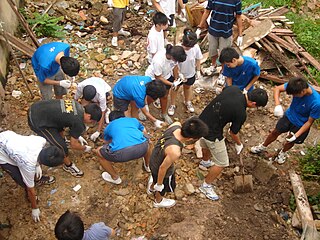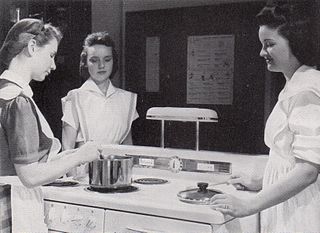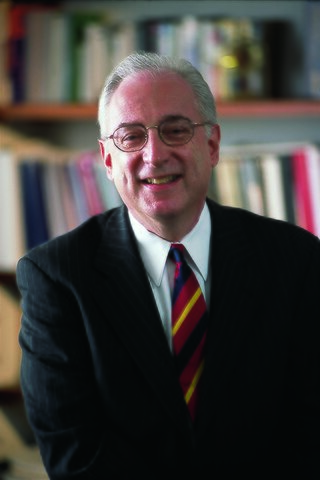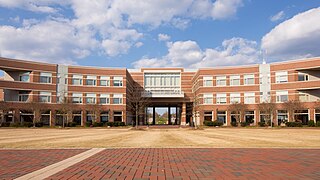
North Carolina State University is a public land-grant research university in Raleigh, North Carolina. Founded in 1887 and part of the University of North Carolina system, it is the largest university in the Carolinas. The university forms one of the corners of the Research Triangle together with Duke University in Durham and the University of North Carolina at Chapel Hill. It is classified among "R1: Doctoral Universities – Very high research activity".

The University of Massachusetts is the five-campus public university system and the only public research system in the Commonwealth of Massachusetts. The university system includes five campuses, a satellite campus in Springfield and also 25 campuses throughout California and Washington with the University of Massachusetts Global.

The Research Triangle, or simply The Triangle, are both common nicknames for a metropolitan area in the Piedmont region of North Carolina in the United States, anchored by the cities of Raleigh and Durham and the town of Chapel Hill, home to three major research universities: North Carolina State University, Duke University, and University of North Carolina at Chapel Hill, respectively. The nine-county region, officially named the Raleigh–Durham–Cary combined statistical area (CSA), comprises the Raleigh–Cary and Durham–Chapel Hill Metropolitan Statistical Areas and the Henderson Micropolitan Statistical Area. The "Triangle" name originated in the 1950s with the creation of Research Triangle Park, located between the three anchor cities and home to numerous high tech companies.

Experiential education is a philosophy of education that describes the process that occurs between a teacher and student that infuses direct experience with the learning environment and content. The term is not interchangeable with experiential learning; however experiential learning is a sub-field and operates under the methodologies of experiential education. The Association for Experiential Education regards experiential education as "a philosophy that informs many methodologies in which educators purposefully engage with learners in direct experience and focused reflection in order to increase knowledge, develop skills, clarify values, and develop people's capacity to contribute to their communities". Experiential education is the term for the philosophy and educational progressivism is the movement which it informed. The Journal of Experiential Education publishes peer-reviewed empirical and theoretical academic research within the field.

Keuka College is a private college in Keuka Park, New York. Founded in 1890, the college emphasizes experiential learning as well as career and pre-professional education. It is classified among "Master's Colleges and Universities (small)" and is accredited by the Middle States Commission on Higher Education. The college offers both bachelor's and master's degrees on its home campus.

Service-learning is an educational approach that combines learning objectives with community service in order to provide a pragmatic, progressive learning experience while meeting societal needs.

Experiential learning (ExL) is the process of learning through experience, and is more narrowly defined as "learning through reflection on doing". Hands-on learning can be a form of experiential learning, but does not necessarily involve students reflecting on their product. Experiential learning is distinct from rote or didactic learning, in which the learner plays a comparatively passive role. It is related to, but not synonymous with, other forms of active learning such as action learning, adventure learning, free-choice learning, cooperative learning, service-learning, and situated learning.
Senioritis is the colloquial name for the decreased motivation toward studies displayed by students who are nearing the end of their high school, college, and graduate school careers, or the end of the school year in general, though is mostly said to occur in senior-level students. Senioritis is not a professionally recognized medical condition, but a colloquial term that combines the word senior with the suffix -itis, which technically denotes inflammation but refers to a general illness in colloquial speech.

Student affairs, student support, or student services is the department or division of services and support for student success at institutions of higher education to enhance student growth and development. People who work in this field are known as student affairs educators, student affairs practitioners, or student affairs professionals. These student affairs practitioners work to provide services and support for students and drive student learning outside of the classroom at institutions of higher education.

Sixth College is the sixth and second-newest college of the University of California, San Diego. It was established in September 2001. Sixth College's core writing program, Culture, Art and Technology (CAT), is a five-course sequence that integrates writing skills into multidisciplinary classes to examine the intersections of culture, art, and technology.

Richard Guarasci was the 18th president of Wagner College in Staten Island, New York. He took office on June 1, 2002 and, as of July 1, 2016, was the college's longest-serving president. He held the rank of professor of political science and taught in the areas of democracy, citizenship and American diversity. Following Guarasci's retirement on June 30, 2019, he became Wagner College's third president emeritus.
The National Survey of Student Engagement is a survey mechanism used to measure the level of student participation at universities and colleges in Canada and the United States as it relates to learning and engagement. The results of the survey help administrators and professors to assess their students' student engagement. The survey targets first-year and senior students on campuses. NSSE developed ten student Engagement Indicators (EIs) that are categorized in four general themes: academic challenge, learning with peers, experiences with faculty, and campus environment. Since 2000, there have been over 1,600 colleges and universities that have opted to participate in the survey. Additionally, approximately 5 million students within those institutions have completed the engagement survey. Overall, NSSE assesses effective teaching practices and student engagement in educationally purposeful activities. The survey is administered and assessed by Indiana University School of Education Center for Postsecondary Research.

Campus Compact is a coalition of colleges and universities committed to fulfilling the public purposes of higher education.

Centennial Campus is a research park and educational campus owned and operated by North Carolina State University in Raleigh, North Carolina, United States. Composed of two locations, the 1,334 acres (5.4 km2) property provides office and lab space for corporate, governmental and not-for-profit entities, in addition to providing space for 75 university research centers, institutes, laboratories and departmental units. Currently, 5,000,000 sq ft (460,000 m2) of constructed space has been built. Upon completion, Centennial Campus is anticipated to have 9,000,000 sq ft (840,000 m2) of constructed space.
The Eugene J. McCarthy Center for Public Policy and Civic Engagement at Saint John's University, serving the College of Saint Benedict and Saint John's University in central Minnesota, is a non-partisan learning and outreach center aimed at fostering enhanced civic engagement and dialog about public policy. The Center sponsors the annual Eugene J. McCarthy Lecture, along with a variety of other programs aimed at CSB and SJU students, alumnae, alumni, faculty and staff, and the broader community. The Center serves students at both the College of Saint Benedict and Saint John’s University.
Andrew Furco is an American scholar, researcher, and educator in the field of experiential education, whose work has focused primarily on advancing research in service learning. Service learning is an instructional approach whereby students participate in community service that is linked to their academic learning. Service learning has been adopted in K–12 schools, colleges, and universities in the United States, Canada and in countries throughout South America, Australia, Africa, Asia and Europe.
The Center for Engaged Democracy is located within Merrimack College’s School of Education. The center develops, coordinates, and supports academic programs around the country that are focused on civic and community engagement. The center supports such academic programs through a variety of initiatives for faculty, administrators, and community partners. There are currently over fifty academic programs focused on community engagement.

The School for International Training, widely known by its initials SIT, is a private non-profit regionally-accredited institution headquartered in Brattleboro, Vermont, United States. The institution has two main divisions. SIT Graduate Institute administers a wide range of internationally-focused master's degree programs as well as a Doctor of Education degree in Global Education. SIT Study Abroad administers undergraduate study abroad programs which combine field-based experiential learning with academic research or internship opportunities.
Action civics is a modern and alternative form of civics education in the United States. Action civics is an applied civic education process in which participants learn about government by examining issues in their own community and then select a focus issue for action through a process of debate, research the issue and learn advocacy strategies, develop civic skills such as public speaking, formulate a plan, mobilize, educate, then evaluate, and reflect on their experience. Participants' voices are encouraged, valued and incorporated. Participants learn by doing, with a focus on collective action. Action civics can encompass a number of different actions from community service to electoral engagement and from talking about concerns with public officials to creating peer education campaigns.
Work-integrated learning (WIL) provides students with the opportunity to apply their learning from academic studies to relevant experiences and reciprocate learning back to their studies. WIL is an umbrella term; opportunities exist in various formats both on-campus and off-campus. Although WIL shares some of the same offerings as work-based learning (WBL), it is distinct in that WIL is part of school curriculum and often guided by learning objectives, while WBL is primarily grounded in the workplace and not necessarily connected to academic studies. WIL opportunities include but are not limited to: apprenticeships, field experience, mandatory professional practice, co-operative education, internships, applied research projects, and service learning. In Canada, WIL is defined by 9 types of experiential learning: (1) Co-op Work Term, (2) Internship, (3) Clinical Placement, (4) Field Placement, (5) Apprenticeship, (6) Applied Research, (7) Entrepreneurship, (8) Service Learning, and (9) Work Experience.












